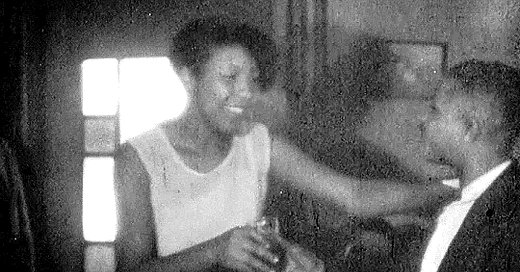Friends,
Above my desk at home hangs a Toni Morrison quote1: “I tell my students one of the most important things they need to know is when they are their best creatively. They need to ask themselves, What does the ideal room look like? Is there music? Is there silence? Is there chaos outside or is there serenity outside? What do I need in order to release my imagination?”
This sentiment sings in my mind, and I often ask myself a version of that essential question: What do I need to remain a steward of care through witnessing and testimony? At the heart of that question is my archival practice. The work completed and ahead for Black Film Archive remains the evolving answer.

Today, the second anniversary of Black Film Archive, I am also reflecting on the question that birthed its creation: What does it mean to make Black cinematic history accessible? Two years in, I know for certain that articulating the visibility of Black cinema, cinema workers, and history means remaining attuned to how Black people live and seeing the fullness of the link between the celebration, contradictions, and crisis that exist in our memory of them. Through this lens, we can all understand that as much as my work is documenting, it is also restorative remembering and reimagining.
As bell hooks wrote in 19942, “though rarely articulated as such, the camera became in black life a political instrument, a way to resist misrepresentation as well as a means by which alternative images could be produced.”
Black Film Archive is:
a platform that converses among the contradictions, silences, and triumphs to add legibility to the visible and invisible.
a place centered on care and savoring the fullness of how black cinematic workers live(d).
a site that pushes the confines of voyeuristic gaze and representation by allowing users to bring their hearts, minds, and non-monolithic approaches to view new possibilities in Black cinematic history.
I work in testimony of people whose voice has been silenced. Sometimes, I need to sit in silence to hear them vividly. Since the first anniversary of Black Film Archive–and nearly full-time since January– I have been working on a new phase of the platform that speaks to the evolving definitions stated above in the hopes that it would be ready for today’s anniversary. But a part of doing justice by your work is honoring the timing it takes to will it into existence. By rushing, I am insinuating that the reward of celebration is more critical than getting the work right. I want to share my missteps in the same way I share the wins because only then is the truth revealed and learned from.
My original letter introducing BlackFilmArchive.com states: “Notably, Black cinema’s value cannot be summed up by a listing of films.... It is more than an idea to be debated and dismissed… Black film bends all conventions and expectations, and resists categorization.” This sentiment echoes in my mind as I work on the next phase of the platform. I’ve been asking myself how to create space to discuss Black cinema beyond limited products of nostalgia — a capitalistic pursuit of narrow depth— and rigid windows of Black existence. The multitude of identities, beliefs, and artistries in Black Film Archive – and its future – ask us to believe in cinematic history beyond nostalgia and what decision-makers have found capitalistically valuable.

Working on Black Film Archive for three years, I’ve spent countless time parsing through the limited notions of Black cinema that are often placed upon the craft by curators, distributors, and white decision-makers. The merry-go-round of suppression and waves of limited amplification of Black cinema is tied to a history of Black cinematic preservation and distribution falling in and out of priority. In Black familial tradition, memory work is the task of everyone. Because the knowledge and individuals in Black Film Archive are now members of my extended family, I affirm I will do all I can to carry on this work in their honor.
Please know that my silence here is not a lack of commitment, but, as the Toni Morrison quote above illustrates, creating the conditions to be my best creatively and make a deeper commitment. In the coming months, I have many exciting announcements, and you will understand the fullness of what I mean.
I constantly reflect on my grandmother’s words: “You don’t know anything until you decide to teach it to another.” This anniversary is for you all because your care, contribution, and questioning have shaped the work. In attempting to share all I know, you all have taught me so much. There is no greater honor in my life than being entrusted with guiding you through Black cinematic history. Thank you all, thank you so much.
Yours,
Maya S. Cade
P.S. - What is your favorite thing you’ve watched on Black Film Archive?
P.P.S - Fast Company listed me on their 2023 Most Creative Person list.
https://www.theparisreview.org/interviews/1888/the-art-of-fiction-no-134-toni-morrison
https://www.college.columbia.edu/core/sites/core/files/pages/hooks--Glory.pdf



Happy anniversary!! 🎊🥳 I love your analysis about the importance of not reducing Black cinema to one thing (especially a capitalist kind of nostalgia). I feel very grateful to be here as I went to film school, and of course the film history they offered was white centric and reductive....You know the feeling of mourning something you’ve never had access to? ❤️🔥
You saw what needed to be done and you summoned what it took to DO it. Thank you for your vision and commitment.